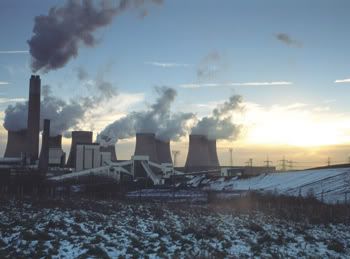"Why should Germans save the world alone?" - the press ahead of the EU summit
 Germany currently holds the rotating EU presidency, and as such, the block's largest economy hosts the European Council (the 'Spring Summit'), where heads of state gather to take tough decisions on climate change and low carbon energy policies.
Germany currently holds the rotating EU presidency, and as such, the block's largest economy hosts the European Council (the 'Spring Summit'), where heads of state gather to take tough decisions on climate change and low carbon energy policies.Ahead of today's summit, German media are asking some critical questions about Europe's role in fighting global warming. Even though former US vice-president Al Gore told reporters today that 'the European Union is absolutely key to helping the world make the change', German editorialists are asking the question "why should we Germans save the world alone?"
EU leaders meeting today and tomorrow are expected to commit to reducing greenhouse gas emissions blamed for global warming by 20 percent by 2020 compared to 1990 levels and 30 percent if other industrialized and emerging nations join in.
But China and the US, the world's biggest polluters, are not likely to join in, which is why skepticism is growing in Europe, as can be read from the following quotes:
"The discussion lacks all sense of proportion. Germany contributes roughly 6 percent to CO2 production worldwide and the figure is declining. Roughly half of all emissions come from the USA and China, where the output continues to grow at double-digit rates." - The business daily Handelsblatt.Mass circulation Bild in a front-page story headlined: "Are We Germans Supposed to Save the World on our own?" writes:
"We Germans are for environmental protection! We're also prepared to make sacrifices for the environment. But sometimes one gets the impression: We're supposed to save the earth ourselves!"The Frankfurter Allgemeine Zeitung, considered to be one of the most 'serious' German newspapers writes:
"What are the biggest polluters, the USA, Russia and China, doing to save the planet?"
"The Christian Social Union wants to ban cars with combustion engines. The Social Democrats wants air travellers to pay a climate tax. The Greens want to slap a tax on air fuel and Greenpeace wants to ban all budget air travel."The center-left Süddeutsche Zeitung writes:
"What's peculiar is that the so-called climate-protectors are punishing mobility and little else. Of course, the environmental costs of traffic are significant and the energy efficiency of travel has to be improved. But much more energy is being consumed by industry and private households."
"Those in the wealthy western industrialized nations who insist on the right to disproportionately emit greenhouse gases are propagating global apartheid. It is almost grotesque to be continuously mentioning the increase in pollution being produced by China and India. What incentive is there for these or other countries to try to attain wealth and prosperity by other means, when not even the richest on earth are willing or able to do so? ...Questioning Europe's solitary grandstanding is a futile exercise, as EU heads of state are committed to reducing greenhouse gas emissions within the Union, and go it alone if necessary. The real problem that will emerge at today's Summit, is the question whether nuclear powers like France and Finland are willing to commit to targets on the use of non-nuclear renewables, and whether member-states are willing to accept mandatory, binding renewable energy targets instead of a voluntary set of aims.
"Climate change cannot be halted with small measures or without making any changes to consumer and lifestyle habits ... Embarking on the road whose destination is a CO2-free economy is simply too great a task. ... Politicians cannot just wait and hope that as many people as possible will start feeling guilty about their behavior. Instead, they have to create a basic framework which then applies to everyone. The more market-friendly the anti-climate change measures are, the better they will fit into the existing system."
On two topics - the launch of 'carbon capture and storage' projects and a mandate to introduce 10% biofuels for transport by 2020 - memberstates are more likely to agree. As the Summit unfolds, we will be reporting back [entry ends here].
 bioenergy :: biofuels :: energy :: sustainability :: ethanol :: biodiesel :: nuclear :: renewables ::greenhouse gas emissions :: carbon dioxide :: United States :: China :: European Union ::
bioenergy :: biofuels :: energy :: sustainability :: ethanol :: biodiesel :: nuclear :: renewables ::greenhouse gas emissions :: carbon dioxide :: United States :: China :: European Union :: --------------
--------------


 During a session of Kazakhstan's republican party congress, President Nursultan Nazarbayev announced plans to construct two large ethanol plants with the aim to produce biofuels for exports to Europe. Company 'KazAgro' and the 'akimats' (administrative units) of grain-growing regions will be charged to develop biodiesel, bioethanol and bioproducts.
During a session of Kazakhstan's republican party congress, President Nursultan Nazarbayev announced plans to construct two large ethanol plants with the aim to produce biofuels for exports to Europe. Company 'KazAgro' and the 'akimats' (administrative units) of grain-growing regions will be charged to develop biodiesel, bioethanol and bioproducts.








0 Comments:
Post a Comment
Links to this post:
Create a Link
<< Home